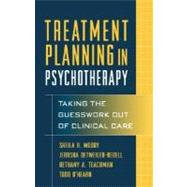This user-friendly book helps clinicians of any theoretical orientation meet the challenges of evidence-based practice. Presented are tools and strategies for setting clear goals in therapy and tracking progress over the course of treatment, independent of the specific interventions used. A wealth of case examples illustrate how systematic treatment planning can enhance the accountability and efficiency of clinical work and make reporting tasks easier--without taking up too much time. Special features include flowcharts to guide decision making, sample assessment tools, sources for a variety of additional measures, and instructions for graphing client progress. Ideal for busy professionals, the book is also an invaluable text for graduate-level courses and clinical practica.








